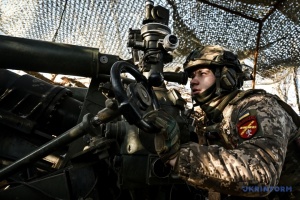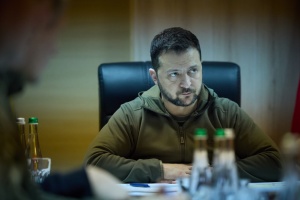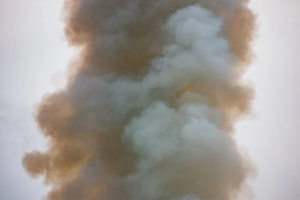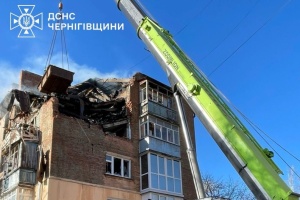
What Prigozhin achieved by staging "weekend putsch"
The armed confrontation between the Wagner PMC and Russian government forces has demonstrated not only the fragility and quirkiness of the central government of the aggressor state. This rather amusing but bloody episode with the destruction of its own aircraft and an unexpected outcome shows that Putin's Russia has finally turned into a failed state.
However, the participants of the drama do not notice this, because they are a priori incapable of noticing this. They will continue to fight among themselves until the Russian Federation collapses. What are the signs that this will happen? First, Prigozhin is clearly not acting alone; the main players of his "team" have not yet come to the fore. But they will come out for sure: the results of the "weekend putsch" are seen as too easy to achieve an unknown goal. Secondly, Prigozhin is in hiding, and he is not one of those who would want to quarrel with his army, which has been fully preserved and is waiting for orders.
Russia has not failed as a state, but it has succeeded as a gang.
The "March of Justice" on Moscow, proclaimed by Yevgeny Prigozhin and carried out by the forces of the Wagner PMC units withdrawn from the Russian-Ukrainian front, began with the taking of control of Rostov-on-Don, Russia, and ended 200 kilometers from Moscow with the unexpected decision of the initiator of the march to stop the victorious march and return to barracks and camps. Ukrinform, Ukrainian and foreign media have reported in detail on all the nuances and vicissitudes of the failed rebellion, its causes and preconditions, so there is no point in retelling the chronicle again. However, there are several significant points of this "vaudeville" that require close attention and detailed consideration.
First of all, it turned out that Russia fully meets the description of a failed state, according to the indicators of German political scientist Ulrich Schneckener. According to his definition, a failed state is characterized by the inability of the state to maintain a monopoly on the use of force, the loss of competence in the provision of public services, and a political system that cuts off both the population and the political opposition from influencing the state decision-making process. All the talk of Kremlin political scientists about "sovereign democracy" has been just an attempt to hide the fact that in the years since the collapse of the USSR, the Russian state has been and remained an artificial entity. And its existence depends not on the will of the people, but on a few dozen vested interests that have created a criminal cartel to exploit natural and human resources from gigantic territories in their favor. And that as soon as the interests of one of the cartel members come into conflict with the others, it does not hesitate to resort to blackmail and the use of force.
The Russian Federation is in a state of development of social relations that is characteristic of the era of feudal fragmentation, its central government neither controls individual regions (Chechnya) nor is able to exercise effective control over parts of its armed forces (Wagner PMC). Russian laws can be ignored in favor of political expediency, as was clearly demonstrated by Putin, who in his Saturday speech declared the Wagner raid on Moscow an armed rebellion, but in the evening of the same day agreed to Lukashenko's "formula" - dropping charges against the rebels in exchange for their return to their permanent locations and Prigozhin's departure to Belarus.
The reaction of the armed forces, the Rosgvardia, the Ministry of internal affairs, and other law enforcement agencies of the Russian Federation to the mutiny is also very significant: none of them engaged in armed confrontation with the Wagnerians. The headquarters of the Southern Military District in Rostov-on-Don was seized without a fight, and numerous military units of the Russian army and special services did not fire a single shot at the rebels. Only military aviation acted against the Wagnerians, but it was so "successful" that it lost six helicopters and an airplane at once, and also shot at civilian cars on the way to Moscow.
This raises the extremely painful question of the Russian central government's control over nuclear weapons arsenals. The Wagnerian mutiny is over, but there is no guarantee that tomorrow or in a week another field commander, or Prigozhin and his Wagnerians, will not seize the tactical nuclear munitions depots and decide to use them either on the battlefield or to start a brisk trade with extremist movements or rogue states. Western countries that have so far held back on helping Ukraine should rethink their approaches, based on the fact that Moscow could lose control of some of its weapons of mass destruction arsenals at any time.
The enemy is weakening, and the West's attitude toward Russia requires new approaches
Ukraine's allies have been assessing Russia based on the assumption that Russia is a country with the same decision-making and control mechanisms as in all modern countries, but that revanchists and supporters of authoritarian methods of government have come to power there. This is a mistake, because Russia is a state where the mentality of the majority of the population, the way in which power is exercised, and the structure of government, despite its external similarities to the West, are fundamentally different. The Russian Federation is a completely feudal structure, similar to Muscovy under Ivan IV, or, in terms and historical analogies more understandable to our Western partners, to the baronial arbitrariness of the time of John Lackland.
Another important conclusion is that the reaction of the majority of the Russian population and part of the Russian opposition to Prigozhin's rebellion was passive, even to the point of approval after the fact. Are the Russians ready to exchange the failed militarists in Moscow for militarists who will ensure their "victory over Ukraine and the West"? They will simply accept any option.
For three centuries, since the creation of the empire by Peter the Great, Russia has been imbued with the spirit of militarism and dreams of territorial conquest. It may seem that three hundred years of unceasing propaganda have turned generations of subjects of the Russian Empire, citizens of the USSR and the Russian Federation, into a community that is ready to give up any of its human and social rights for the sake of more and more conquests. But this is not entirely true. Most people want "Russia to be feared." But, like any abstraction, this maxim quickly collapses when faced with resistance. This has happened many times in Russian history, and it will happen again now - reality will overcome the infantile dreams of premature imperialists.
Many people were surprised by Mikhail Khodorkovsky's call to support Prigozhin's rebellion. However, it was a completely logical appeal that is in line with the aspirations of the Russian opposition, since its goal is not to establish a democratic regime or simply change the government. He tried to book a place with the powerful: for all the people in the world, there comes a time when they need not only armed bandits, but also those who are doing something in politics and business.
Otherwise, under all the czars, secretaries general, and presidents, the essence of Russian politics has remained unchanged. Outside, it was territorial and economic expansion; inside, it was militarization and exploitation of its subjects. The Russo-Swedish wars, Catherine the Great's "Greek project," the Russo-Ottoman wars, the "Great Game" with Great Britain, the Comintern's organization of artificial revolutions in Europe, the creation of a bloc of "socialist camp" countries, and the events of modern history with Russian invasions of the former Soviet Union, the Balkans, and Africa all testify to the continuity of Russian imperialist policy, no matter what words and terms it is covered with.
The First World War is a typical example: Nicholas I, the Provisional Government, and Russian socialist and democratic parties, despite their desperate struggle for power, equally sought victory and control over the Black Sea straits. Centuries have passed, but Russian imperialism, no matter what external forms it takes, remains unchanged. So does the fact that Russian aggression, whether military, cultural, or ideological, stops where it is repelled.
Prigozhin's mutiny, which is clearly not yet complete, has already raised a wave of conspiracy explanations, including the ludicrous version that everything happened by agreement with Putin. In this way, Putin was allegedly trying to identify a hidden "fifth column" in Russia. But this is just ridiculous. And the story of the Pryzhyn rebellion is clearly not over yet - this is the main thing. Because in fact, it is absolutely certain (and there is no conspiracy here) that Prigozhin did not act alone, and his "support group" remains in the shadows. The Wagner Putsch greatly weakened the Kremlin's position, because it turned out that the central government and its security forces were unable to defend themselves against a not very large but organized military force, that the road to Moscow was not controlled and protected. That the Russian population will calmly accept any change of government - not a single action in support of the central government has taken place in Russian cities. And the first to try to take advantage of this set of chances will be Prigozhin and his company. Girkin-Strelkov and their "reconstructors" of imperial idiocy are also, as they say, at a low start. There will be more to come. But at least these first two groups will definitely not make peace with each other.
Then what, a civil war is coming to Russia? It is more than likely. So if this was one of Putin's "two-steps," then already on the first move, one clay foot of the Russian colossus tripped the other.
And the most important conclusion from the Russian "weekend putsch," in the author's opinion, is that very specific centrifugal processes are beginning in Russia. Unlike countries with a modern system, where centrifugality is understood as the desire of territories to acquire signs and tools of independence in one way or another, in Russia, as a country with an archaic semi-feudal system and mentality, centrifugality is manifested primarily in the separation of military units from performing general tasks.
And the last thing. Even if the outbreak of a civil war in twenty-first century Russia is postponed, the coup will lead (and has already led) to a further weakening of the Russian army, which is exactly what Ukraine and our allies will benefit from.
Dmytro Redko, Kyiv





